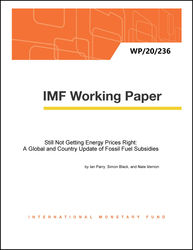
Still Not Getting Energy Prices Right: A Global and Country Update of Fossil Fuel Subsidies
Still Not Getting Energy Prices Right: A Global and Country Update of Fossil Fuel Subsidies
READ MORE...
Volume/Issue:
Volume 2021
Issue 236
Publication date: September 2021
ISBN: 9781513595405
$5.00
Add to Cart by clicking price of the language and format you'd like to purchase
Available Languages and Formats
| English |
Prices in red indicate formats that are not yet available but are forthcoming.
Topics covered in this book
This title contains information about the following subjects.
Click on a subject if you would like to see other titles with the same subjects.
Economics- Macroeconomics , Public Finance , Economics / General , Environmental Economics , Environmental Conservation and Protection , Natural Resources , fossil fuel subsidies , efficient fuel prices , supply costs , climate change , local air pollution mortality , revenue gains , spreadsheet tools , , fossil fuel subsidy , supply cost , price reform , fossil fuel , fuel user price , Non-renewable resources , Fuel prices , Energy subsidies , Greenhouse gas emissions , Global
Summary
This paper provides a comprehensive global, regional, and country-level update of: (i) efficient fossil fuel prices to reflect their full private and social costs; and (ii) subsidies implied by mispricing fuels. The methodology improves over previous IMF analyses through more sophisticated estimation of costs and impacts of reform. Globally, fossil fuel subsidies were $5.9 trillion in 2020 or about 6.8 percent of GDP, and are expected to rise to 7.4 percent of GDP in 2025. Just 8 percent of the 2020 subsidy reflects undercharging for supply costs (explicit subsidies) and 92 percent for undercharging for environmental costs and foregone consumption taxes (implicit subsidies). Efficient fuel pricing in 2025 would reduce global carbon dioxide emissions 36 percent below baseline levels, which is in line with keeping global warming to 1.5 degrees, while raising revenues worth 3.8 percent of global GDP and preventing 0.9 million local air pollution deaths. Accompanying spreadsheets provide detailed results for 191 countries.
Copyright © 2010 - 2026
Powered by:
AIDC



